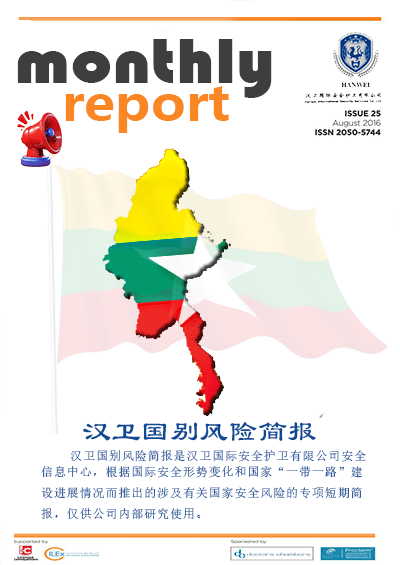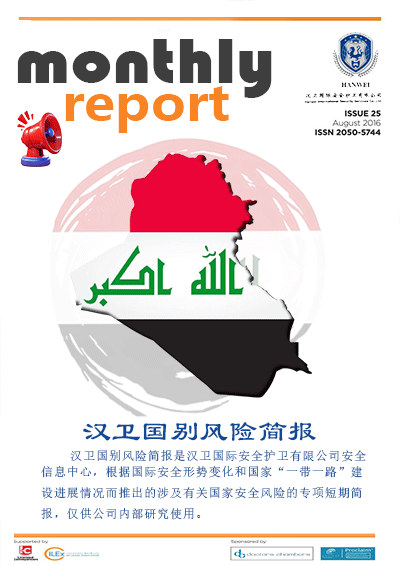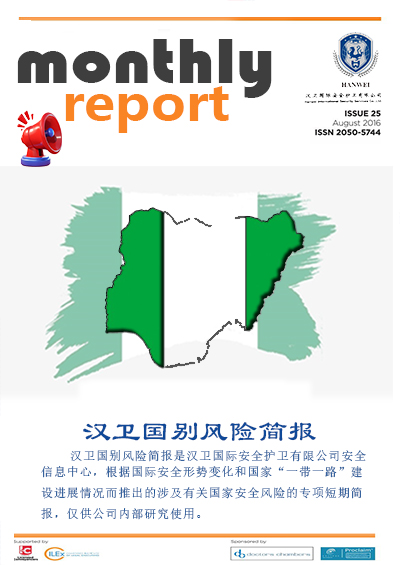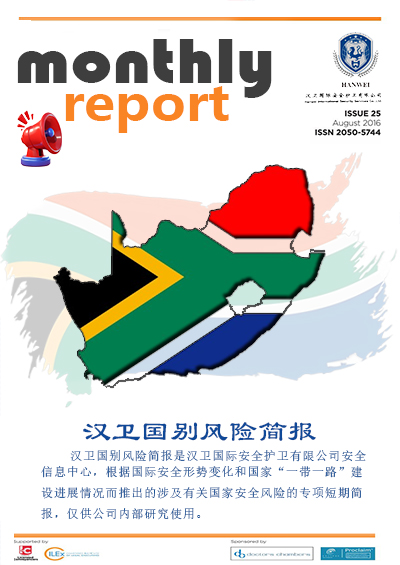Country Risk Security Brief:
South Africa Security Overview – April
Researcher No. 006
According to monitoring reports from Hanwei International’s security officers in South Africa and related media coverage, Hanwei International assesses that South Africa’s political-economic, social security, natural disaster, and public health conditions remained severe this month. Politically and economically, South Africa faces dual pressures from U.S. tariff threats and internal disputes within the coalition government, severely threatening domestic political stability and overall economic development. Social security risks remain prominent, with frequent violent incidents such as kidnappings, shootings, cash-in-transit heists, and crimes involving fake police officers, leading to declining public satisfaction with law and order. Heavy rainfall in multiple regions has caused rising water levels in rivers like the Vaal, triggering floods. Public health conditions are concerning, with outbreaks of foot-and-mouth disease and malaria proving difficult to control.
I. Political and Economic Aspects
(1) U.S. Tariff Pressure: South Africa’s Overall Situation Remains Grim
Since 2025, South Africa and the U.S. have experienced fundamental disagreements on international affairs. The U.S. suspended all aid to South Africa, citing its new Expropriation Bill and stance on Israel, expelled South Africa’s ambassador, and imposed a 30% "reciprocal tariff" under former President Donald Trump, bringing bilateral relations to a historic low.
A planned April 9 tariff hike—affecting textiles, agriculture, automotive, chemicals, and metals—was suspended, with South Africa placed on a 90-day reprieve with a 10% tariff rate. However, the U.S. continues to impose 25% tariffs on South African steel, aluminum, and automobiles.
Post-90 days, whether the U.S. will reinstate high tariffs remains a major political debate in South Africa. Different interest groups may clash over whether to resist or compromise, exposing further divisions within the already fragile Government of National Unity (GNU). Opposition parties may exploit the situation to criticize government decisions, undermining political stability.
Meanwhile, the 25% tariffs on key sectors are already damaging South Africa’s economy: Economic slowdown: Exports in affected industries have plummeted, reducing corporate revenues and shaking investor confidence. Sectoral impact: The automotive sector, accounting for 22% of exports to the U.S., faces severe order declines. Employment crisis: Mass layoffs and wage cuts in tariff-hit industries are increasing unemployment and social instability.
(2) VAT Hike Plan Strains Coalition Government
The African National Congress (ANC) and Democratic Alliance (DA), the two main parties in the GNU, clashed over a proposed value-added tax (VAT) increase. The ANC argued it would fund education, infrastructure, and healthcare, while the DA warned it would worsen living costs amid high unemployment and inflation.
On April 24, the Finance Ministry scrapped the VAT hike plan, temporarily easing tensions. However, the rift between the parties has deepened, raising risks of a coalition collapse and political turmoil.
II. Social Security Risks
(1) Kidnappings
Most recorded kidnappings occurred in the Eastern Cape, where business leaders warn that rising violent crime is driving away investment. 205 kidnappings were reported in 4 2024, with foreign merchants—including Chinese nationals—being prime targets.
April 8, 5:00 AM: A 38-year-old Chinese national was ambushed and kidnapped by armed assailants on the M19 highway in Nelson Mandela Bay. Police are investigating for attempted murder and kidnapping.
GqeberhaApril 10, 7:00 PM: American missionary Josh Sullivan was kidnapped in Gqeberha. The Hawks (South Africa’s elite police unit) rescued him, killing three suspects.
(2) Shootings
Cape Town has seen a surge in gang-related shootings, with victims often shot multiple times.
March 29: Two shootings in Lavender Hill left 3 dead, 3 injured. Police seized 9 illegal firearms.
April 26–27: 10 bodies were found across Cape Town, many with multiple gunshot wounds. No arrests made.
(3) Robberies & Thefts
Cash-in-transit heists: KwaZulu-Natal (KZN) leads in such crimes. On March 28, 10 gunmen robbed a cash van in Pietermaritzburg, shooting a guard.
Fake police robberies: Criminals in KwaMashu (Durban) impersonate officers to rob homes.
April 23: Gauteng police arrested five suspects (aged 50–69) who hijacked a solar panel truck while posing as police.
III. Public Emergencies
(1) Natural Disasters
Vaal River floods: Heavy rainfall raised dam levels to 120.69% by April 28, forcing evacuations.
Weather alerts:
Level 4 (Yellow): Northern Cape, North West, Free State (flood risks).
Level 2 (Yellow): Gauteng, Eastern Cape, KZN (severe thunderstorms).
Red alerts: Central/eastern regions (potential hailstorms, snow).
(2) Public Health
Foot-and-mouth disease: 147 cases in KZN; Eastern Cape remains stable.
Malaria: Rising cases in Limpopo, Mpumalanga, KZN due to cross-border spread from Mozambique, Botswana, and Eswatini.
Security Recommendations for Chinese Enterprises & Individuals
Monitor policy shifts, strengthen financial management: Stay updated on political changes, adjust business strategies, and avoid politically sensitive discussions.Enhance security measures, avoid high-risk areas: Choose secure locations, avoid keeping valuables at home, and minimize nighttime travel.Prepare for emergencies, prioritize health: Stock emergency supplies, follow evacuation orders, and maintain hygiene to prevent disease.Hanwei International advises heightened vigilance and proactive risk mitigation.




